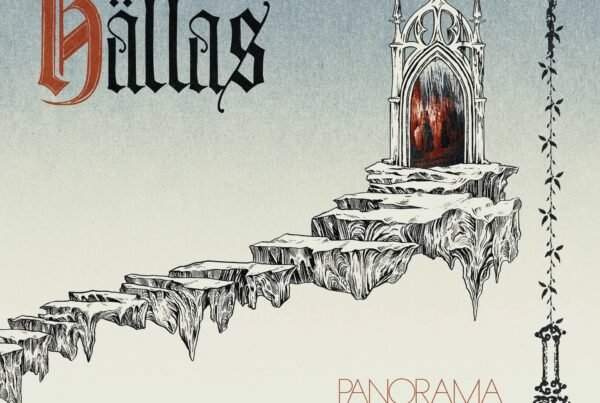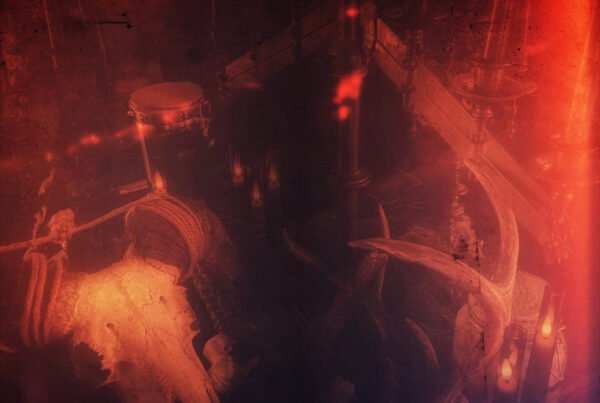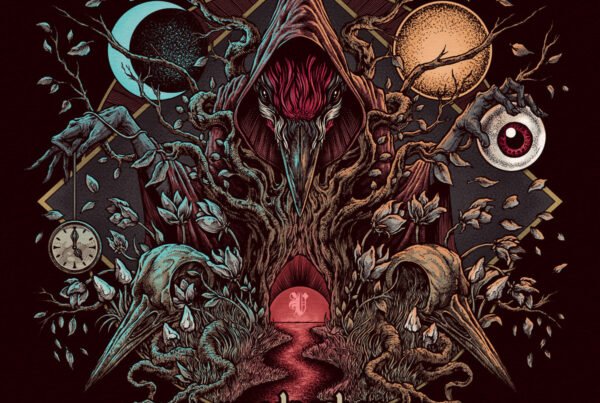Damián Ojeda’s Trhä unlocks the gate to joy, pain, and magic in this enigmatic EP
Release date: June 30, 2025 | Independent | Bandcamp | Instagram
There is a certain image that may spring to mind when one hears the words ‘solo raw black metal project.’ A crusty, pale creature locked in his basement for days at a time, dedicating offerings of blastbeats and blown-out tremolo picking to his Nokia microphone. Lyrics about Satan, the forest, the snow, cast in a blasphemous snarl over the frostbitten, repetitive music. Perhaps the spectre of racism and far-right ideologies hangs in the background, shining its hateful eye down upon the wicked sacrament. Even when abhorrent politics are not involved, raw black metal, especially among the throng of solo projects in the style, can be very stuck in its own traditions and predictable, deterring many from engaging with new artists in the style.
One musician who has brought new life and innovation to raw black metal while preserving its authenticity is Damián Ojeda, who has more than 20 solo projects. Through nearly all of their music, there is a through-line of lo-fi production, mystical atmosphere, and intense emotional expression. Trhä is their main foray into raw atmospheric black metal, and has all of these qualities to the maximum. It is also the sole outlet for their linguistic endeavours – they have developed four languages from scratch, and all of Trhä’s titles and lyrics are written in them, making the music all the more mysterious. In an interview with Invisible Oranges, they divulged a glimpse into the project’s hidden lore. ‘Trhä’ itself means ‘key,’ and it is meant to guide the listener to Endlhetonëg, an imagined fae realm which is responsible for the magic in our own lives.
Ojeda is incredibly prolific, and has six releases out this year under the Trhä name alone. They manage this abundance with purely improvisational songwriting. In an interview with Black Metal Chronicles, they explain how they essentially sit down and play whatever comes to them on guitar until a song emerges, which is insanely impressive given the cohesion of the music. The impulsivity of the songwriting process comes across more clearly than before in Trhä’s releases from 2025. They remain raw and atmospheric, but also feel restless, shifting riffs frequently and in unexpected ways. While I would describe all of 2025’s Trhä content as compelling, I think this 2-song, 28-minute EP di nido jad – ◊untwan law¶ur dëhajt◊ejn – a∫ëtana lín bë feels the most complete and beautiful out of all of them.
The EP begins with “helëna,” perhaps the first Trhä song to resemble a common name. Due to the linguistic barrier, it is unclear whether it refers to any specific person, or what it says about them, but the emotions surrounding the subject are complex. The song opens on soft acoustic strumming with just a touch of melancholy, and flows through anguish and triumph, broken lows, and soaring highs before a passionate crescendo. While the drumming is intense and the vocals a constant wail, the lead guitars remain nearly clean throughout and twinkle like shooting stars. There is a kind of innocent humanity to “helëna” that overturns so many of the grim connotations of raw atmospheric black metal. However, there is deep sadness in Ojeda’s screams, and the persistent melodic shifts between major and minor suggest conflicted feelings. Whoever helëna is (I imagine some kind of young fairy princess), they cause as much pain as they do joy.
“helëna” has a linear song structure, and moves through many different ideas before it concludes, but somehow these disparate sections are held together by intangible emotional continuity. There is a purpose behind it that allows every new riff to hit hard, and I believe this to be the most cohesive Trhä song of the year so far. The litany of riffs come to a rushing, pounding climax, reminiscent of Ojeda’s shoegaze influences in Sadness. Then the noise breaks into ambience, like fairydust cascading around one’s shoulders, and a rising mantra of harplike synth spirits us away to the second song.
Where “helëna” has a smooth emotional flow from start to finish, the enigmatically-titled “nu’ëma bën ëf ja nu’ëma ma£ se¶ac” has a more erratic approach. It begins with one of the most unconventional moments of any Trhä song, a looping synth over a simple breakcore beat which leaves all possibilities open, and one wonders if Ojeda will even start rapping. They instead morph this beat into grooving black metal, and from there it’s one frantic riff after another. Unlike “helëna”, there is manic exultation in the lead guitar here, flying about in its upper range before crashing to earth, though an undercurrent of sadness is present at times as well. Ojeda also allows some primitive screamo energy to infiltrate various build-up sections of the song, evoking their post-hardcore project Life. The song structure is linear, and only one riff recurs a second time, but the riffs seem like variations of each other, giving several sections an illusory sense of cathartic return. The frequent shifts in riff can be dizzying over the sixteen-and-a-half-minute runtime of “nu’ëma bën ëf ja nu’ëma ma£ se¶ac”, but it is nonetheless impressive to observe the way they build off each other.
Across both tracks, di nido jad – ◊untwan law¶ur dëhajt◊ejn – a∫ëtana lín bë manages a depth of passion and a driving force that stands out from the rest of Trhä’s catalogue this year. Though it can’t be said that either song is catchy, with no repeating hooks to speak of or any intelligible lyrics, the infectious energy behind every single riff has me coming back for more all the time. The sound of the EP doesn’t reinvent the Trhä wheel, but the nearly clean tone of the lead guitars and the relative lack of black metal static makes it feel light, free, and crisp compared to other releases. The brief breakcore appearance at the beginning of “nu’ëma bën ëf ja nu’ëma ma£ se¶ac” opens the door for future experimentation in that direction, and given the consistent quality of Ojeda’s solo efforts lately, I would welcome it. Between this, the full album, and the split with Midoran which dropped on the same day, this is a good, if overwhelming, time to be a Trhä fan.
Page header photo taken from Ojeda’s Instagram






